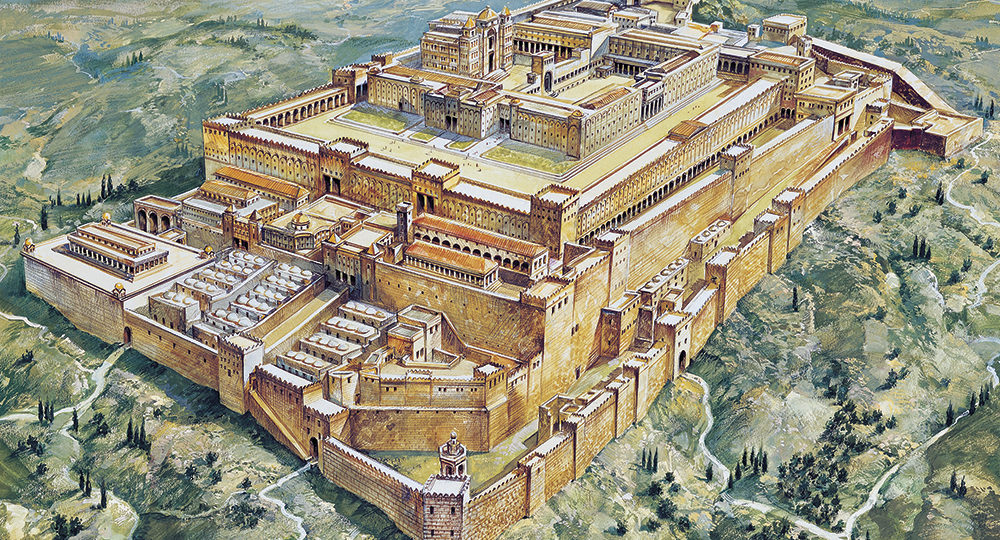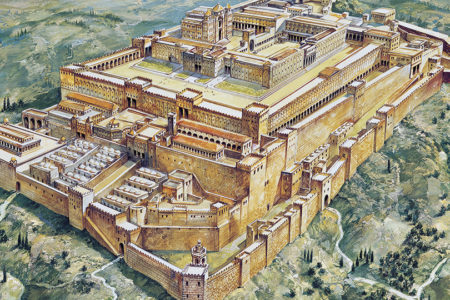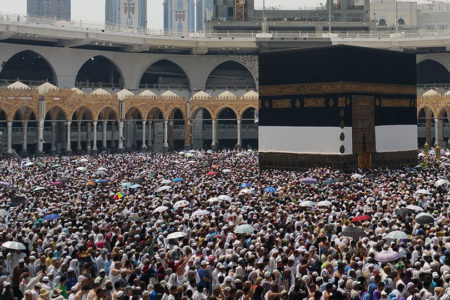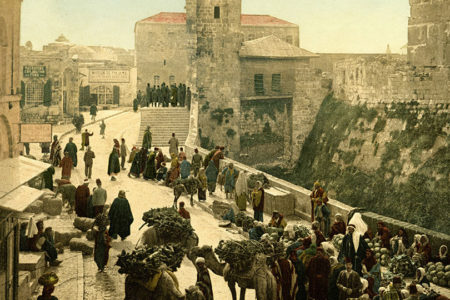City of the Great King
History tells tales of many amazing cities. There was the splendor of ancient Athens, the magnificence of Rome, the wonder of Babylon, and the astonishing Colossus that once stood guard over the entrance to the ancient city of Rhodes, to name a few.
But no city can ever boast of its history and struggles or the presence of the Most High God like the ancient city of Jerusalem. Jerusalem is mentioned in Scripture more than 800 times and is the only city on Earth God chose to be “the city of the great King” (Ps. 48:2; Mt. 5:35).
Jerusalem began a 15-month-long celebration of its 3,000th anniversary in September 1995 when it commemorated King David’s conquest of the city.
But Jerusalem is even older than that and has been a focal point of the Bible since the days of Abraham.
After Abraham rescued his nephew Lot from four kings who attacked Sodom, Gomorrah, Admah, Zeboiim, and Zoar, he was visited by another king: “Then Melchizedek king of Salem brought out bread and wine; he was the priest of God Most High” (Gen. 14:18).
Salem is the ancient name for Jerusalem. As the psalmist Asaph wrote, “In Salem also is His tabernacle” (Ps. 76:2).
The word salem is related to the Hebrew word shalom and can be translated as “peaceful.” Melchizedek was king and priest to the Most High God from a city named Peaceful.
Yet throughout its history, Jerusalem has seen little peace. According to a secular historian, “it has seen at least 118 conflicts. It has been razed at least twice, has been besieged 23 times, and has had at least five separate periods of violent terrorist attacks in the past century.”1
The first conflict mentioned in the Bible came in the days of Joshua. When Adoni-Zedek, king of Jerusalem, heard how the Israelite Joshua had captured Ai, he struck an alliance with four other kings in an effort to destroy Gibeon, a city greater than Ai that had deceived the Israelites into a treaty of protection (Josh. 10:1–5).
The Lord used Joshua to deliver Gibeon and kill the enemy kings. At this point, Jerusalem was under Jebusite rule and was known as Jebus. The Jebusites are usually classified as Canaanites, but only in a geographical sense. The Bible carefully distinguishes them from ethnic Canaanites (Gen. 15:21; Ex. 3:8, 17).2
The Israelites ultimately failed to cleanse their inheritance of pagans. Not until David did Jebus finally fall to the Jewish people: “And the king and his men went to Jerusalem against the Jebusites, the inhabitants of the land…. David took the stronghold of Zion (that is, the City of David)” (2 Sam. 5:6–7).
David quickly made Jerusalem his capital. Then he “brought up the ark of God . . . to the City of David [Jerusalem] with gladness” (6:12).
David wanted to build a Temple, but God told him, “You shall not build a house for My name, because you have been a man of war and have shed blood” (1 Chr. 28:3). Instead, God told David, “It is your son Solomon who shall build My house” (v. 6). The name Solomon comes from the word shalom and means “peace.”
No city but Jerusalem could have housed the Temple because God declared, “I have chosen Jerusalem, that My name may be there” (2 Chr. 6:6). It took Solomon seven years to build the Temple, which was finished in 960 BC.3
After Solomon, Jerusalem experienced difficulties. The kingdom became divided. Jerusalem remained the capital of the southern kingdom of Judah, which also included the tribe of Benjamin. The remaining 10 tribes constituted the northern kingdom of Israel, or Ephraim. In 722 BC Assyria overthrew the northern kingdom.
But Jerusalem remained in Jewish hands until 586 BC, when the Israelites’ rejection of God and His Law brought judgment, as Moses had prophesied:
But it shall come to pass, if you do not obey the voice of the Lᴏʀᴅ your God, to observe carefully all His commandments and His statutes which I command you today, that all these curses will come upon you and overtake you. The Lᴏʀᴅ will bring you and the king whom you set over you to a nation which neither you nor your fathers have known. Then the Lᴏʀᴅ will scatter you among all peoples, from one end of the earth to the other. In the morning you shall say, “Oh, that it were evening!” And at evening you shall say, “Oh, that it were morning!” because of the fear which terrifies your heart (Dt. 28:15, 36, 64, 67).
The Babylonians conquered the southern kingdom and burned the holy city. Solomon’s Temple was leveled, and the Israelites went into captivity in Babylon, as God had promised through the prophet Jeremiah (Jer. 25:11–12).
In 538 BC, Persian King Cyrus the Great allowed the Jewish people to return home, as Isaiah had prophesied. God had said Cyrus would perform all His pleasure, “Saying to Jerusalem, ‘You shall be built,’ and to the temple, ‘Your foundation shall be laid’” (Isa. 44:28).
Over time, Jerusalem and the Temple were rebuilt and dedicated in 515 BC. Even though the Jewish people had lost sovereignty over Jerusalem, it remained their holy city. Sacrifices continued until Jerusalem was attacked in 167 BC by Seleucid ruler Antiochus IV, known as Epiphanes. After waging a guerilla-like rebellion headed by the Maccabees, the Jewish people threw off their oppressors and rededicated the Temple in 164 BC.
Jerusalem was the capital of the Hasmonean (Maccabean) empire until Rome invaded in 63 BC. The Romans appointed Herod the Great as king over Jerusalem. He ruled from 37 BC until his death in 4 BC. He began renovating the second Temple, a project that took 46 years. This was the Temple Jesus visited as a child and taught from during His ministry. Herod’s Temple, along with Jerusalem, was destroyed in AD 70, as Jesus had foretold in His Olivet Discourse in Matthew 24.
Although the world refuses to acknowledge Jerusalem as a Jewish city, God has no such problem. God promises to “bring back the captives of Jacob, and have mercy on the whole house of Israel” (Ezek. 39:25). In Ezekiel 40—48, He provides a multitude of details concerning the Millennial Temple, the city, and the land allotments that will go to the tribes of Israel.
He has destined Jerusalem to be the capital of a literal, 1,000-year Messianic Kingdom (Rev. 20:4–6). “And the name of the city from that day shall be: THE LORD IS THERE [Jehovah-Shammah]” (Ezek. 48:35).
After the thousand years, there will be a new heaven and new earth, “for the first heaven and the first earth had passed away” (Rev. 21:1). The New Jerusalem will come down from heaven, “prepared as a bride adorned for her husband” (v. 2).
This incarnation of Jerusalem will be unlike any city ever seen: “The city is laid out as a square; its length is as great as its breadth…. twelve thousand furlongs. Its length, breadth, and height are equal” (v. 16).
Bible scholar John Walvoord explained, “The city is 12,000 stadia in length and width, approximately 1,400 miles on each side. Tremendous as is the dimension of the city, the amazing fact is that it is also 1,400 miles high.”4
According to the apostle John, “The Lord God Almighty and the Lamb are its temple. The city [has] no need of the sun or of the moon to shine in it, for the glory of God illuminate[s] it. The Lamb is its light” (vv. 22–23).
Jerusalem, the City of the Great King, will never again endure destruction, attack, or disease. It will only know God’s eternal presence. What a day that will be!
ENDNOTES
- Stefan Lovgren, “Jerusalem Strife Echoes Ancient History,” National Geographic News, October 29, 2004 <tinyurl.com/JeruCline01>.
- John Rea and Ronald Youngblood, “Jebus, Jebusites,” Wycliffe Bible Encyclopedia (hereafter cited as Wycliffe), paperback ed., unabridged, Charles F. Pfeiffer, Howard F. Vos, and John Rea (Chicago, IL: Moody Press, 1983), 886.
- Huber L. Drumwright Jr. and John Rea, “Temple,” Wycliffe, 1,673.
- John F. Walvoord, “Revelation,” The Bible Knowledge Commentary, ed. John F. Walvoord and Roy B. Zuck (Wheaton, IL: Victor Books, 1985), 2:986.









I see it seems as if God is a scare crow. But I shall my crown and rull my city and beyond with no compromises. As I am still working in a stone I noticed some how God is becoming nothing. mind sinning, it looks not wise.